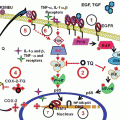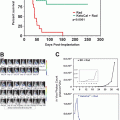Trial numbera
Objectives
Patient population
Intervention
Stage of trial
Country
NCT01473290
Prevention of gastrointestinal complication
Cancer patients treated by chemotherapy or radiation therapy to pelvic region
VSL#3 (mixture of probiotic strains)
Phase III
USA
NCT01723592
Improvement of the quality of the vaginal flora
Women with breast cancer treated with chemotherapy
Mixture of probiotic strains of L. rhamnosus, L. jensenii, L. crispatus, L. gasseri
Phase II
Austria
NCT00197873
Prevention of chemotherapy-related diarrhea
Patients on first-line CAPOX treatment for metastatic colorectal cancer
L. rhamnosus GG
Phase II
Finland
NCT01579591
Pathological major response rate in patients with rectal cancer
Rectal cancer patients undergoing concurrent chemotherapy and radiation therapy
VSL#3 (mixture of probiotic strains)
Phase III
Italy
NCT01480011
Prevention of high-dose chemotherapy-induced oral mucositis
Cancer patients treated with high dose chemotherapy with autologous stem cell transplantation
Lactobacillus CD2 Lozenges
Phase II
India
NCT01706393
Prevention of radiation-induced enteropathy
Cancer patients treated with abdominal/pelvic radiation therapy
(mixture of several probiotic strains)
Phase II
South Korea
NCT01790035
Acute treatment-related GI toxicity
Cancer patients with GI malignancy
Probiotic LGG
Phase III
USA
NCT02144701
Reduction of incidence of Graft-Versus-Host disease
Patients who have undergone donor stem cell transplant
Lactobacillus Rhamnosus GG
Pilot study
USA
Irinotecan is one of key drug used in the treatment of colorectal cancer, but its toxic metabolite is associated with malabsorption and the development of diarrhea (Michael et al. 2004). It is known that probiotic bacteria reduce activity of intestinal beta-d-glucuronidase, and therefore these bacteria could be applied in the prevention of diarrhea in patients treated by this food supplement. Given their low toxicity and good tolerability, probiotics may be an important part of supportive therapy.
Randomized, double blind, placebo controlled pilot study suggest that administration of probiotic formula Colon DophilusTM compared to placebo is associated with reduction of gastrointestinal toxicity of irinotecan-based chemotherapy, and these results were consistent for all types of recorded gastrointestinal toxicity. Administration of probiotics compared to placebo led to a reduction in the incidence of severe diarrhea of grade 3 or 4 [0 % for probiotics vs. 17.4 % (95% CI 1.9–32.9 %), for placebo, p = 0.11], as well as reduction of the overall incidence of diarrhea [39.1 % (95 % CI 19.2–59.0 %) for probiotics vs. 60.9 % (95 % CI 41.0–80.8 %) for placebo, p = 0.24] and incidence of enterocolitis (0 % for probiotics vs. 8.7 % for placebo). Patients on placebo arm reported more often bloating compared to probiotic arm. Moreover, no infection caused by probiotic strains used in this study was observed. Although limited statistical power caused by lower sample size than expected, these data suggest probiotics could be simple, effective, and nontoxic approach to reduce gastrointestinal toxicity of irinotecan-based chemotherapy (Mego et al. 2015) (Table 1).
Administration of 5-fluorouracil, one of the key anticancer drugs in treatment of colorectal cancer, is associated not only with direct mucosal damage but also with development of lactose intolerance and diarrhea in duration-dependent manner. Lactobacillus rhamnosus GG supplementation reduced the frequency of severe diarrhea and abdominal discomfort related to 5-FU-based chemotherapy in the study with 150 colorectal cancer patients. Moreover, the probiotic administration was well tolerated, and none L. rhamnosus was identified in the blood cultures during the study (Osterlund et al. 2007).
Recently, the results from 11 randomized, controlled trials concerning on the efficacy of probiotics in people with cancer (N = 1557 participants) displayed reducing the severity and frequency of diarrhea in patients with cancer and the requirement for antidiarrheal medication, respectively. Meta-analysis found that probiotics significantly reduced incidence of CTC (Common Terminology Criteria for Adverse Events) grade ≥2 diarrhea (odds ratio 0.32, 95 % confidence interval, 0.13–0.79, PI 0.11–0.97, p = 0.01), but was unclear for CTC grade ≥3 diarrhea (odds ratio 0.72, 95 % CI of 0.42–1.25, 95 % PI of 0.41–1.27, p = 0.24) (Redman et al. 2014).
4 Probiotics and Radiation Therapy
Radiation therapy is an inherent part of anticancer treatment; however, it is associated with several adverse effects. Some of them are related to mucosal damage by ionizing radiation, with subsequent alterations in intestinal flora, accelerated small and large bowel transit, malabsorption of bile salts, and development of gastrointestinal toxicity manifested in the form of diarrhea, nausea, or loss of appetite (Ludgate and Merrick 1985; Gami et al. 2003). Diarrhea is the most significant toxicity of patients undergoing radiation therapy to the area of the abdomen and pelvis. The incidence of diarrhea ranges from 50 to 90 % when total tumoricidal dose of 45 Gy is administered (Andreyev et al. 2005). While chemotherapy is mostly associated with the development of neutropenia, administration of radiotherapy alone is usually not associated with severe hematological toxicity, and therefore the risk of iatrogenic infection caused by probiotics is very low. This is the reason for relatively more experience with probiotics in patients treated with radiation therapy.
Experimental animal models have shown that intestinal microbiota play a role in the development of radiation-induced intestinal damage, while germ-free animals were more resistant to lethal radiation enteritis (Crawford and Gordon 2005). Radiation reduces the intestinal motility (Husebye et al. 1995; Summers et al. 1991), and consecutive slower stool transit can lead to bacterial overgrowth, especially from gram-negative bacteria (Husebye et al. 1995), described in up to 45 % of patients with postradiation diarrhea (Danielsson et al. 1991). This imbalance together with inflammatory response could increase the permeability of the mucosa barrier and promote the bacterial translocation (Berg 1999), which can subsequently lead to development of pelvic sepsis described in 3–4 % of patients during treatment (Andreyev et al. 2005; Ludgate and Merrick 1985).
Two animal studies investigated the effect of probiotic supplementation in irradiated male Wistar rats. The first study supported the potential of Lactobacillus delbrueckii subsp. Bulgaricus B3 strain, in the prevention of postradiation intestinal damage as well as in prevention of gastrointestinal toxicity (Demirer et al. 2006). In the other study, animals received probiotic mixture containing Lactobacillus acidophilus, Lactobacillus helveticus and Bifidobacterium sp. to evaluate bacterial translocation and endotoxinemia after abdominal irradiation. Rats receiving probiotic supplementation presented a statistically significant reduction of endotoxin levels and bacterial translocation. Probiotics administration was associated with qualitative change in bacterial translocation. Gram-negative bacteria were predominant in blood cultures of rats fed with placebo, while gram-positive bacteria were more common in blood samples from probiotic group (Seal et al. 2007). Recent animal study showed a protective effect of probiotics on intestinal epithelium from radiation injury in a TLR-2/cyclo-oxygenase-2-dependent manner (Ciorba et al. 2012).
Several, randomized clinical trials and one meta-analysis examined preventive and therapeutic role of probiotics in patients treated with radiation therapy and some are ongoing (Tables 1 and 2). Three trials focused on prevention of radiation-related diarrhea (Salminen et al. 1988; Delia et al. 2007; Giralt et al. 2008).
Table 2
Clinical trials evaluating preventive and therapeutic role of probiotics in patients treated with radiation therapy
Study aim | Patient population | Randomized patients (patients in analysis) | Study arms | Study outcome | Author |
|---|---|---|---|---|---|
Prevention | Cervical and uterine cancer treated with radiotherapy | 24 (21) | Lactobacillus acidophilus vs. no intervention | Diarrhea Probiotics: 27 % Control: 90 % p < 0.05 Rescue medication for diarrhea Probiotics: 9 % Control: 60 % p < 0.05 | Salminen et al. (1988) |
Treatment | Mixture of cancer in lower abdomen treated with postoperative radiotherapy | 205 (205) | Lactobacillus rhamnosus vs. placebo | Need for rescue medication for diarrhea Probiotics: 35 % Placebo: 48 % p = NS | Urbancsek et al. (2001) |
Prevention | Cervical, sigmoid or rectal cancer treated with postoperative radiation therapy | 490 (482) | VSL#3 (mixture of probiotic strains) vs. placebo | Diarrhea (all grades) Probiotics: 31.6 % Placebo: 51.8 % p < 0.001 | Delia et al. (2007) |
Prevention | Cervical cancer treated with chemo-radiation therapy or endometrial cancer treated with radiotherapy | 118 (85) | Lactobacillus casei DN-114 001 vs. placebo | Co-primary endpoint defined as: At least four or more bowel movements, need for rescue medication, or premature withdrawal because of lack of efficacy. Probiotics: 68.2 % Placebo: 58.5 % p = NS | Giralt et al. (2008) |
Prevention | Head and neck cancer treated with chemo-radiotherapy | 200 (188) | Lactobacillus brevis CD2 lozenges vs. placebo | Grade III and IV mucositis: Probiotics: 52 % Placebo: 77 % p < 0.001 Anticancer treatment completion rates: Probiotics: 92 % Placebo: 70 % p = 0.001 | Sharma et al. (2012) |
The pilot controlled trial included only 21 patients with cervical or uterine carcinoma treated with radiotherapy. This trial showed beneficial effect of probiotics in this patients’ population; however, this study had several weaknesses including a small sample size and lack of double-blinded placebo-controlled design (Salminen et al. 1988).
The efficacy of probiotic Lactobacillus casei DN-114 001 to reduce the incidence of radiation-induced diarrhea in patients with advanced cervical and/or endometrial carcinoma undergoing pelvic radiotherapy or chemoradiotherapy was investigated in large trial. Although 115 patients were randomized at the beginning; only 85 patients were included to final analysis. This trial was double blind; placebo controlled study, and didn’t show statistically significant differences between two randomized arms. This study had some limitation as well, including insufficient statistical power, relatively low dose of utilized probiotic strain, and heterogeneity of treatment populations, when some patients underwent only radiation while some were treated with concomitant chemo-radiotherapy (Giralt et al. 2008).
The largest of these trials included 482 patients. This was a double-blinded, randomized, placebo-controlled study. The study investigated probiotic formula VSL#3, containing viable lyophilized bacteria from several different strains of lactobacilli (L. casei, L. plantarum, L. acidophilus, L. delbrueckii subsp. bulgaricus), bifidobacteria (B. longum, B. breve, B. infantis) and one strain of Streptococcus salivarius subsp. thermophilus. This study conclusively confirmed that VSL#3 is an effective and safe preventive therapy. Patients receiving probiotics had significantly lower incidence (31.6 % vs. 51.8 %, p < 0.001) and also severity of diarrhea compared to placebo. Authors also reported significantly lower mean daily number of bowel movements and shorter time of rescue medication use (loperamide) in probiotic group (Delia et al. 2007).
Meta-analysis of these three preventive trials included 632 patients did not show significant benefit of probiotics compared to placebo in prevention of radiation-induced diarrhea (odds ratio = 0.47, 95 % confidence interval: 0.13–1.67). However, the few available trials and the presence of significant clinical and statistical heterogeneity limited the analysis (Fuccio et al. 2009). No major adverse events owing to probiotic supplementation were reported in any study. However, the few available clinical studies do not allow firm conclusions (Fuccio et al. 2009). In addition to these mentioned results, one case study suggested that probiotics can be used effectively in the management of chemotherapy-induced diarrhea in patients with advanced breast cancer (Abd et al. 2009).
Stay updated, free articles. Join our Telegram channel

Full access? Get Clinical Tree





